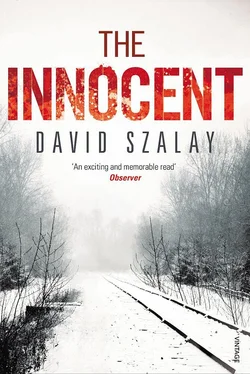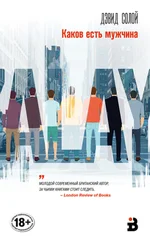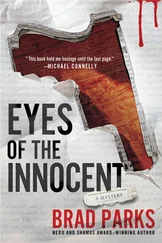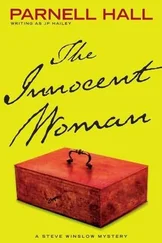‘I know. And you don’t hate me for it?’
It took me a moment to understand that this was a question. ‘No.’
For what seemed like a long time she sat there in silence. It was too dark for me to see her face. Then she leaned towards me and kissed me on the forehead. As soon as she had done this, she stood up and a second later I heard the squeak of the bedsprings.
Only then did it occur to me that she might have expected a warmer welcome, perched on the sofa in the middle of the night, with her hip or thigh pressing against my leg. She had sat there, it now struck me, for several minutes, as if waiting for something, and I had not moved. Maybe you will smile at this, Irishka. Please smile at it! Even when she leaned down and kissed my forehead, and her falling hair tickled my face, I had not so much as moved.
Making no effort to be quiet – quite the opposite – I pulled myself into a sitting position, and for a minute or two I sat there, as she had, on the edge of the sofa. Then, stepping slowly through the darkness, I went and stood over her. I stood there for a long time, listening to the silence, which seemed to paralyse me. It was as if I might have stood there forever. ‘Are you asleep?’ I said finally. She said nothing, and did not move. ‘Nadya?’ When she still said nothing, still did not move, I put out my hand. I was further from the bed than I had thought.
I want to tell you everything, and I will. As soon as I touched her, on the shoulder I think, she sat up violently. I thought she was going to hit me, until the unexpected presence of her tongue in my mouth made me think otherwise. I toppled over and lay on the floor underneath her. That went on for a few minutes. Then quite suddenly, it stopped. She stood up and pulled her nightdress over her head. Then, while she waited, I undressed – there was some precarious hopping as I took my trousers off, some fiddling with stubborn shirt buttons. I’m sorry to say I did not take off my socks – I thought I had kept her waiting long enough – and wearing only those not very fresh socks, with my hands I found her in the dark. And there was a surprising lot of her to find. She was a tall woman, and I was used to your small limbs.
You should laugh at what follows, Irishka. The slightest movement on that mattress produced a loud squeaking of the springs, and the walls were thin. We struggled to stay quiet. It wasn’t possible of course. We even fell off the bed and landed on the floor with a thud that must have woken the whole flat. For a while, we tried to press on as though nothing had happened, until eventually she whispered, ‘Wait!’ and we stopped, and stood up, and felt our way wearily back onto the mattress, which sagged like a hammock.
In the morning it was snowing. The first snow of autumn. Huge flakes like white hens’ feathers silently filling the windless air. The snow increased the strangeness of the situation, the strangeness of the warmth of another woman. Until then I had known only you. Watching it fall, I thought of you – thought of the same snow falling where you were – of you watching it fall. I did not understand what had happened. I turned from the window and saw that she had woken up. Lying on the bed under a single sheet, she was watching me. The snow-light made soft pale shadows. With a strange sort of shyness, she wrapped herself in the sheet and took the few steps to the table for her cigarettes. Later I dressed while she made tea. We sat in silence, drinking it. Outside the falling snowflakes were smaller and flurrying. When the tea was finished, I left.
I did not see you that day, as I had said I would. For a week I was not able to face you. That was when the final estrangement took place. Then there was only logistics. The work of taking things apart. A week or two later, you and Nikita turned up one morning in a truck, splashing through the flooded potholes of Malyshev Street. I suspect it was Nikita who insisted that you take everything. When it was finished, he left, wiping his hands, sweating in his shirt. You were still taking a last look, making sure nothing had been forgotten, or perhaps just lingering in the room where you had lived for so many years. Places like that are transfigured when you know you are leaving them for the last time. For a moment, they seem new again.
We went down the stairs in silence. On the landing you stopped. ‘Irina …’ I said. I see your face now, my love – one side of it in shadow, the other in the light from the window, lined with tears. They weren’t for me. I know what they were for. They were for the memory of a dead idea. We had lost faith in the idea of our life together. Unfortunately, Irishka, the process of losing faith in something, once it has started, is not easy to stop. Perhaps only a major sacrifice will do it. A sacrifice is always a sort of assertion. You wiped the tears impatiently from your face. It was the last time we were alone together, on the landing, in the wet-plaster smell of the stairwell, next to the window which overlooked the yard. ‘It’s okay,’ you said, and we went down the last flight of stairs and out into the street.
When I went up on my own – my legs were trembling – it seemed strange that only a few minutes earlier you had been standing there, on the landing, wiping your eyes. And now that was over.
FOR THE NEXT two weeks, when he finished work, he walked to Karl Libknekht Street through the shortening twilight and looked up at the light in the second-floor window. In the morning, he shaved with icy water – more and more of his things were migrating from Malyshev Street – peering at himself in the speckled mirror. Then put on his shoes and left for work.
Lozovsky was mentioned only once in those weeks, when his wife suddenly said, ‘Do you feel sorry for Mikhail?’ They were in bed. It was early evening. It surprised him that she should mention her husband in such an offhand way. ‘Yes,’ he said.
‘Why?’
‘I liked him.’
‘Did you?’ She seemed surprised. ‘Why?’
‘Why these questions?’
‘I just want to know.’
‘I don’t know why.’
Her next question, a minute or two later, was ‘Did you like me the first time you saw me?’
‘Yes.’
‘When was the first time you saw me?’
It would have been the first night he spent at Metelyev Log. His memories of that night? His shoes were soaked through. The interior of the house smelled of wax polish, of kerosene – warm, oily smells. The milky hoods of the lamps looked like huge luminous mushrooms. The floor sounded hollow under his feet. However, he had no memory of her from that night.
‘So you didn’t like me the first time you saw me,’ she said, with a laugh, when he told her this.
‘I don’t know. Maybe not the very first.’
‘You liked me then though, when we met at Metelyev Log?’
‘Yes.’
‘You didn’t seem to.’ Though he was facing away from her, he was able to hear the smile in her voice. She put her hand forcefully through his hair and pulled it.
‘Didn’t I?’
‘No, you didn’t. You’re very secretive, aren’t you?’
He told her that when he got back from Metelyev Log, that first time, he had seen a Komsomol poster in Sverdlovsk station, a huge poster hanging half-hidden in darkness. It showed a rosy-cheeked young woman, wearing heavy workers’ clothes, a mauve headscarf and an expression of exquisite stoicism as she trowelled mortar onto the brick that she was holding in her mittened hand. The woman in the poster looked quite like her, he said – more than that, there was about her a placid stillness very like the first misleading impression she herself had made on him (her china-blue eyes cow-like in their clouded placidity when she looked up from the page to see her husband and the Chekist enter the house) and he had fallen asleep that night thinking of her, and of the woman in the poster, the two of them merging together in his mind, so much so that when he next saw her, a few months later, he was surprised how different they were. She laughed. ‘Were you disappointed?’ she said.
Читать дальше












